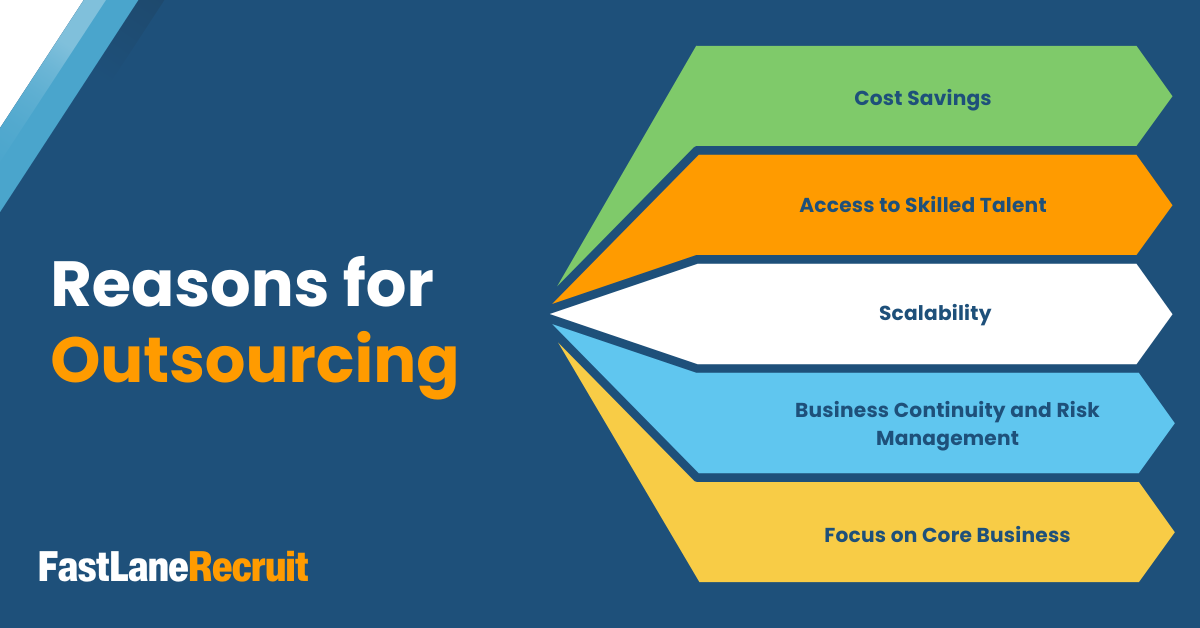Outsourcing non-core business processes allows companies to concentrate their resources on core, revenue-generating activities while benefiting from long-term cost efficiency. By leveraging outsourcing services, businesses can avoid the time and expense of recruiting, training, and retaining in-house staff for support functions. For companies in need of reliable outsourcing in Malaysia, this approach offers both operational relief and strategic value.
This business practice is especially impactful in a digitally connected and skilled market like Malaysia, where global companies can access top-tier talent across a wide range of industries, IT, finance, customer service, marketing, and more. With supportive government policies and a highly educated, multilingual workforce, Malaysia is increasingly recognised as a premier outsourcing destination in Asia.
Also Read: Benefits of Global Outsourcing
Content Outline
Key Summary
Outsourcing is the delegation of specific tasks to third-party experts to improve efficiency and lower costs.
Malaysia is a strategic outsourcing destination due to its skilled talent, competitive costs, and strong digital infrastructure.
Outsourcing types include onshoring, offshoring, and nearshoring, each with different benefits.
Outsourcing helps businesses scale quickly, improve focus, and access specialised expertise.
FastLaneRecruit provides expert outsourcing support through remote team solutions in Malaysia, focusing on compliance, scalability, and speed to hire.
What Does Outsourcing Mean?
Outsourcing refers to the practice of hiring external organisations or service providers to handle certain business tasks or operations that were traditionally performed in-house. This strategic move allows companies to focus on core activities while leveraging external expertise, technology, and cost efficiencies.
Example:
A US-based SaaS company outsources its 24/7 customer support to a Malaysian BPO firm located in Penang. This allows them to provide round-the-clock support to users worldwide in English, Malay, Mandarin, and Tamil, Malaysia’s key working languages, while keeping operational costs significantly lower than if the team were based in Silicon Valley.
Malaysia is regulated by agencies like the Malaysian Investment Development Authority (MIDA) and the Malaysia Digital Economy Corporation (MDEC). These bodies offer tax incentives, funding, and support for foreign investors engaging in outsourcing and shared services.
Visit MIDA for investment policies
Visit MDEC for digital economy programs
How Organizations Use Outsourcing
Businesses across industries use outsourcing to achieve different strategic goals. In Malaysia, both multinational corporations (MNCs) and SMEs outsource operations such as:
- Information Technology (IT) – software development, infrastructure management, technical support.
- Customer Support – multilingual contact centre operations, live chat, helpdesk support.
- Human Resources (HR) – recruitment process outsourcing (RPO), payroll, and compliance.
- Finance and Accounting – bookkeeping, auditing, tax filing, and financial analysis.
- Marketing – content creation, SEO, social media management, and performance advertising.
By outsourcing these tasks, companies improve performance, cut costs, and expand capabilities without significantly increasing internal headcount.
Also Read: Guide to Payroll Outsourcing in Singapore
Reasons for Outsourcing

1. Cost Savings
Outsourcing helps reduce fixed and variable operational costs. For example, salaries and benefits in Malaysia are more affordable compared to those in the US, UK, or Australia.
2. Access to Skilled Talent
Malaysia’s workforce is highly educated, fluent in multiple languages, and experienced across global industries. You can tap into specialised skills, such as fintech developers or compliance experts, without investing in lengthy training.
3. Scalability
Outsourcing provides the flexibility to scale operations up or down quickly based on demand, without the burden of long-term contracts or hiring freezes.
4. Business Continuity and Risk Management
Delegating critical yet non-core functions to reliable partners helps businesses maintain operations during emergencies, such as economic downturns or talent shortages.
5. Focus on Core Business
By outsourcing routine or time-consuming tasks, internal teams can concentrate on strategic areas like innovation, customer experience, and market expansion.
Also Read: Benefit of Outsourcing Accounting to Malaysia
Types of Outsourcing
| Type | Description | Best Use Case |
| Onshoring | Outsourcing within the same country. | When legal, cultural, or language alignment is critical. |
| Offshoring | Outsourcing to a distant country, often for cost efficiency. | Tech support, IT development, back-office functions. |
| Nearshoring | Outsourcing to nearby countries with similar time zones. | Real-time collaboration, regional compliance needs. |
1. Onshoring
Onshoring keeps outsourced functions within the same country. While it offers cultural familiarity and regulatory ease, it often lacks cost-saving benefits.
2. Offshoring
Offshoring to Malaysia is popular among US, UK, and Australian firms due to lower operational costs, strong IP protection, and government-backed tech infrastructure.
3. Nearshoring
Singapore, Indonesia, and Thailand frequently nearshore to Malaysia due to shared business culture, overlapping time zones, and geographic proximity.
Also Read: How to Effectively Hire and Manage Remote Employees: A Comprehensive Guide
Examples of Outsourcing
1. Recruitment Outsourcing:
An Australian logistics company planning ASEAN expansion partners with FastLaneRecruit to source, vet, and onboard local logistics managers and warehouse supervisors across Malaysia, with full compliance with EPF/SOCSO regulations.
2. IT Services Outsourcing:
A European bank outsources cybersecurity monitoring to a certified Malaysian IT vendor that provides 24/7 services and adheres to both EU GDPR and Malaysia’s PDPA.
3. Customer Experience Outsourcing:
A startup from the Middle East establishes a multilingual call centre in Malaysia to manage inbound calls from English- and Arabic-speaking customers, utilising Malaysia’s diverse language capabilities.
Pros and Cons of Outsourcing
| Factor | Advantages | Disadvantages |
| Cost Efficiency | Reduces labour, office, and operational costs | May involve hidden setup or transition costs |
| Expert Access | Gain access to global experts & latest technologies | Less direct oversight or control |
| Focus on Core Tasks | Frees time for high-value activities | Dependency on third-party providers |
| Speed and Flexibility | Quicker ramp-up or scaling | Cultural or communication gaps if not managed |
| 24/7 Operations | Time zone differences enable round-the-clock services | Need for robust SLAs and monitoring |
Ethics of Outsourcing
Ethical outsourcing ensures fair wages, humane working conditions, and data privacy compliance. Malaysia upholds these through:
- Employment Act 1955 – Protects minimum wages, working hours, and conditions.
- Personal Data Protection Act 2010 (PDPA) – Regulates the processing of personal data in commercial transactions.
- Minimum Wage Order 2022 – Mandates fair compensation for all workers in Malaysia.
Companies must choose outsourcing partners with ethical labour practices, transparent operations, and proper certifications such as ISO 27001 for information security.
Also Read: 5 Team-Building Tips for Your Remote Team
Insourcing vs Outsourcing
| Category | Insourcing | Outsourcing |
| Control | High | Moderate |
| Cost | Higher (infrastructure & HR costs) | Lower (shared vendor resources) |
| Expertise | May need internal training | Access to ready experts |
| Scalability | Slower | Flexible, faster |
| Setup Time | Long | Short |
While insourcing offers more control and security, outsourcing offers scalability and rapid access to expertise especially useful for SMEs and growing enterprises.
Outsourcing Trends
- AI-Enhanced Outsourcing
AI is streamlining BPO processes through automation, predictive analytics, and chatbot-driven customer service. - Cybersecurity in Focus
Vendors are investing in cybersecurity certifications to handle sensitive operations like payroll, HR, and legal documentation. - Green Outsourcing
Companies now factor sustainability into vendor selection, favouring those using renewable energy, e-documents, and green-certified data centres. - Outcome-Based Contracts
Clients and vendors are shifting from time-based to performance-based models tied to SLAs like customer satisfaction scores or sales conversions. - Malaysia as a Growth Hub
Malaysia’s digital economy initiatives like ,MyDIGITAL and Industry4WRD, are positioning the country as a long-term outsourcing powerhouse.
Build Your Remote Team in Malaysia with FastLaneRecruit
FastLaneRecruit provides services to global companies from Australia, Hong Kong, Singapore, and the United States hire and manage remote teams in Malaysia without setting up a local entity. As your Employer of Record (EOR) partner, we take care of recruitment, onboarding, payroll, and compliance, so you can focus on scaling your business with confidence.
Whether you are expanding your tech team or hiring specialized talent, FastLaneRecruit makes it simple to build a high-performing team in Malaysia.
Contact FastLaneRecruit today to start building your remote team in Malaysia.


